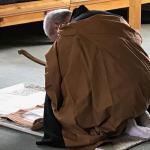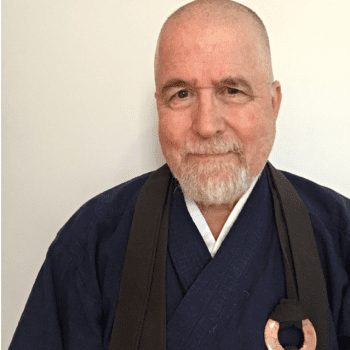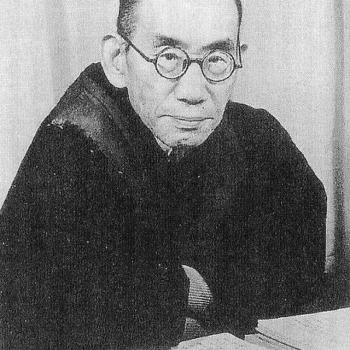
studio of Juan de Flandes
circle 1490
Simplicity, simplicity, simplicity! I say, let your affairs be as two or three, and not a hundred or a thousand; instead of a million count half a dozen, and keep your accounts on your thumb nail.[1]
Within weeks of my arrival at the first church I was to serve in the suburbs of Milwaukee, I received an invitation into a small local clergy support group. The caller, a United Church of Christ minister said with the invitation, that I’d be welcome so long as I didn’t go on too much about Jesus. As they knew I was the new Unitarian minister, well. A small joke, containing a serious invitation. I was welcome as I was.
I suspected I would like them a lot. And I did. Thanks to social media, I’ve continued to be in touch with one of them for well beyond thirty years now. They were kind. And all in differing degree more experienced than I. They helped me through some hard moments. I’m not sure I could have made it through my first year without them.
In one of our early conversations the subject turned to spiritual practices. One of the colleagues, a Methodist minister, offered how every year he ironed a shirt as a spiritual practice. He described in detail how he proceeded. And it was a good description of the structure of both ironing a shirt and a spiritual discipline.
The problem was that it was ironing a shirt once a year.
Everyone laughed. He was kidded mercilessly, starting with the big question. What did his wife think of his spiritual practice? On a similar note, in my early Zen days women occasionally ruefully noted how now that cleaning toilets was considered a spiritual discipline, all of a sudden, the men were all agog to take on the task. A couple openly mused about how long this would last.
Now my minister friend was not wrong. He outlined how he prepared for the practice. And he described the full-heartedness of every part of ironing a shirt. And, in Zen we do say one time could do it.
Those who try zazen even once
Wipe away beginningless crimes.[2]
We can in a moment see into the heart of the matter. And there’s no reason why carefully ironing around buttons one time might in fact do the trick. And usually not.
It’s important to see how ironing could be a spiritual practice. Could be for any of us. There’s the element of discipline, of regularity, of digging deep. These are generally necessary hallmarks of a genuine spiritual practice. Doing it over and over again is, for most of us, most of the time, going to also be part of the deal.
Any of the regular activities of our daily lives can become a significant part of our spiritual disciplines. And so cleaning and cooking are the stuff of Zen practice.
When I cook the first step is cleaning up. Preparing to prepare the meal. I find it an invitation into the sacred moment. If I’m working from a recipe I read it once or twice. I set out the ingredients, spices, etc. And then I try to do just one thing at a time, and not to fret about the rest of the project. I attempt to proceed deliberately, aware of each step, giving it my full attention. I try not to look at the instructions again until I’ve finished the step. I proceed this way to the end.
In all these practices I’ve found often that less is more. I suspect this is the underlying principle of the conscious life-style choice of voluntary simplicity, and Thoreau’s of cited “simplicity, simplicity, simplicity.”
The secret sauce, if you will, is all along the way, to pause. And notice.
The other ingredient is:
Repeat.
One of the great Zen traditions is formal meal practice. In Japanese Soto Zen this is called oryoki. Oryoki means “just enough.” In Rinzai the practice is called for the bowls, jihatsu. And in Korean Son, gongyang, meaning offering.
The roots of the practice trace to the lives of early Buddhist monastics, where the robes and the begging bowl were the essentials of entering the ordained path. Later in Chinese Zen the “robe and bowl” were the symbols of transmission, recognition of deepest insight. And along the way formal disciplines emerged, rituals of eating. In Japanese and Korean Zen these would become fairly detailed, the Koreans more simply, the Japanese ever more detailed.
While it is possible to get lost in those details such as how you hold your hands and even how you use your fingers, something powerful is presented. Doors open. I’ve found during retreat that eating can be among the most transformative moments, constant invitations into a presence filled with attention and gratitude. Equal to or even more powerfully inviting than formal meditation or liturgy.
The are numerous articles to be found on the internet and Youtube provdes a number of videos that provide detailed instructions for the monastic or retreat meal. For here I want to offer a simple outline for oryoki inspired mindful eating.
First, prepare the space. Set out what you will need. There’s no need for it to be the formal Zen bowls and cloths. Use your ordinary plates, bowl, a glass or cup, utensils. Arrange then in some manner. I recommend using our western traditions for table settings, modified to your situation. Google Emily Post, if you need. Arrange the containers with the prepared food.
Two, pause. Set an intention of gratitude. Perhaps say a grace. Something from your childhood. Something that touches your heart. The Zen rituals provide a list of ancestors on the way. It can be a guide for you own list of those to whom you are grateful for bringing you to this moment.
Three, serve the food. Try to be conscious of the act of picking up bowls or other containers. Appreciate the physicality of serving.
Four, do it quietly. And with attention. Traditionally this is a communal meal. But you can do it by yourself. But if with people, less can be more. If doing this as a practice try eating in silence. Or, try eating silently for the first five minutes or so. Then, when talking, not losing sight of the moment, the food, and all that it brings and means.
Five, as you move toward the end, pause. Perhaps offer another intention or prayer of gratitude. In formal oryoki as one moves toward cleaning up a special offering is made for hungry ghosts, those mythological (perhaps) beings whose greed has caused them to be reborn with enormous stomachs and tiny mouths – beings who can never get enough, who are never satisfied. Remembering them, and perhaps ourselves within them, is a powerful moment.
Six, clean up. Washing dishes can be a powerful extension of the practice.
The invitation in this and in all these moments of invitation is to notice our ordinary and our sacred lives are not two. Not really. Not as it matters most.
Bringing Zen home.
[1] Henry D. Thoreau, Walden: Or, Life in the Woods, Thomas Crowell, New York, 1899, p. 94
[2] Hakuin, Song of Zazen, Empty Moon Zen Liturgy, nd, np, p. 7. https://www.emptymoonzen.org/wp-content/uploads/2023/09/EMZ-General-Liturgy-5th-Edition.pdf


















